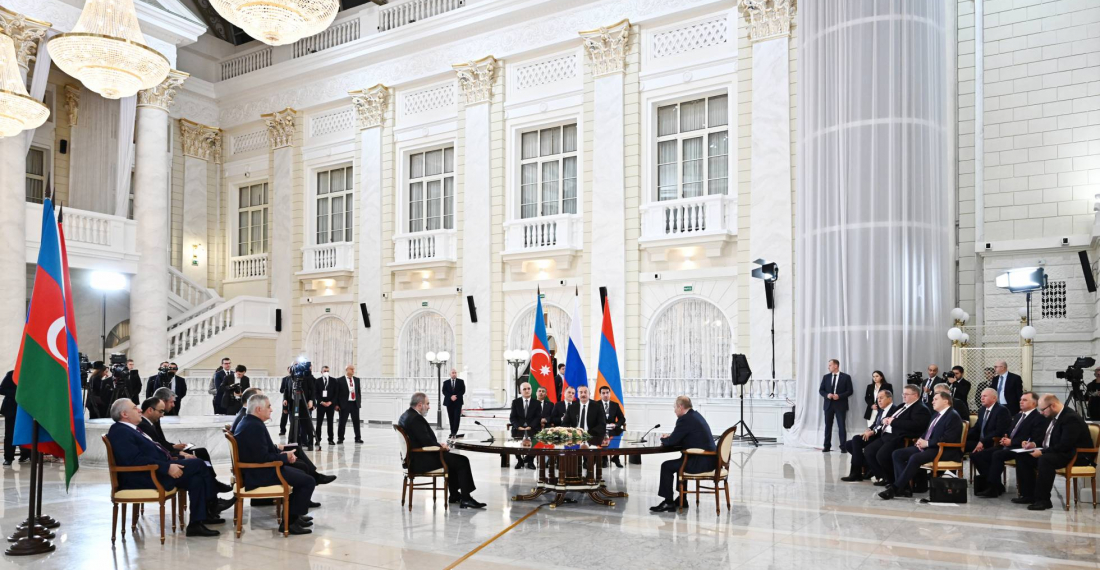The president of Russia, Vladimir Putin, on Monday (31 October) hosted in Sochi the leaders of Armenia and Azerbaijan, prime minister Nikol Pashinyan and president Ilham Aliyev.
Putin met separately with the two leaders, before hosting a two-hour trilateral meeting to discuss the current state of Armenia-Azerbaijan relations. The highly choreographed meetings in the grand settings of the Kremlin's summer residence in Sochi did not, it seems, result in the expectations that the Russian leader had of the sessions. After concluding the discussions only Putin made press comments, saying that they could not agree on many issues, but that he still felt that the meeting was "useful". The Russian president said that many elements that had been included in the draft of the statement prepared by the experts had to be deleted.
In the joint written statement eventually issued at the end of the meeting, the three leaders touched upon the current state of Armenia-Azerbaijan relations, and the role of Russia. The statement appeared to endorse most of what was included in the Prague statement of 6 October 2022 between the president of the European Council, the president of France and the leaders of Armenia and Azerbaijan. The statement appeared to give a nod to a continuing Russian military force in Nagorno-Karabakh, and spoke about dialogue between representatives of societies.
The full text of the Sochi statement of 31 October 2022 reads:
"We, the Prime Minister of the Republic of Armenia N.V. Pashinyan, President of the Republic of Azerbaijan I.H. Aliyev and President of the Russian Federation V.V. Putin, we met in Sochi on October 31, 2022 and discussed the implementation of the tripartite statements of November 9, 2020, January 11, 2021 and November 26.
We reaffirmed our commitment to strictly observe all the above-mentioned agreements based on the interests of the comprehensive settlement of Armenian-Azerbaijani relations, ensuring peace, stability, security and sustainable economic development in the South Caucasus. We agreed to make additional efforts towards the urgent solution of the remaining, including humanitarian, problems.
Noting the key contribution of the Russian peacekeeping troops in ensuring security in the area of its deployment, we emphasized the need for its efforts aimed at stabilizing the situation in the region.
We agreed to refrain from the use of force or the threat of its use, to discuss and resolve all problematic issues solely on the basis of mutual recognition of sovereignty, territorial integrity and inviolability of borders, in accordance with the UN Charter and the 1991 Alma-Ata Declaration.
We emphasized the importance of active preparation for the signing of a peace treaty between the Republic of Armenia and the Republic of Azerbaijan with the aim of achieving stable and long-term peace in the region. Based on the available working options, an agreement was reached to continue the search for mutually acceptable solutions. The Russian Federation will provide possible assistance to it.
We emphasized the importance of creating a positive atmosphere between the Republic of Armenia and the Republic of Azerbaijan for the continuation of the dialogue between the representatives of societies, expert communities and religious leaders with the help of Russia, as well as for the start of tripartite inter-parliamentary contacts aimed at strengthening the trust between the peoples of the two countries.
The leaders of the Republic of Armenia and the Republic of Azerbaijan welcomed the readiness of the Russian Federation to contribute in every possible way to the normalization of relations between the Republic of Armenia and the Republic of Azerbaijan, to ensure stability and prosperity in the South Caucasus."






